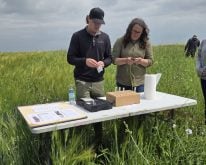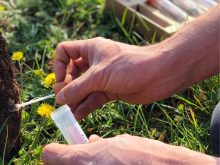WINNIPEG – The march towards biologicals is gaining speed.
In the second week of July, Syngenta and Nufarm both announced collaborations with smaller biotech firms to build up their portfolio of biological products in the pipeline.
Syngenta has partnered with Intrinsyx Bio, a Silicon Valley company, to develop a line of endophyte products.
“Endophytes — small micro-organisms that colonize in plants — fix atmospheric nitrogen directly into the plant, increasing the availability and uptake of key nutrients such as phosphorus,” says a July 8 release from Syngenta.
“This reduces the need for synthetic fertilizers.… Formulations will be offered as seed treatment and foliar application in key agricultural crops.”
“Biological” is a generic term to describe crop protection and fertility products that are derived from bacteria, fungi, plant extracts and other natural organisms.
Many researchers are studying the bacteria and other organisms in the soil, hoping to find microbes that can protect a crop from pests or deliver nutrients to plants.
However, some scientists, including Manish Raizada from the University of Guelph, believe that endophytes, which live inside plants, represent a bigger opportunity for agriculture.
“I’ve shied away from soil microbes because soil is the most microbially rich habitat on Earth,” he said.
“To me, the complexity of the soil microbiome is beyond my capacity…. I’m much more optimistic that in the short run … the microbes that inhabit plants, we can manipulate or select for those.”
Leaders at Syngenta and Intrinsyx Bio seem convinced endophytes could deliver real results to growers.
“Partnering with Syngenta allows farmers around the world to benefit from endophytes’ proven mode of action and extensive field testing that improves nutrient use efficiency and increases crop yields,” said Greg Thompson, Intrinsyx Bio chief executive offer.
Meanwhile, on July 9, Nufarm announced a collaboration with a biotech company from Oxford, England.
Nufarm, a crop protection and seed technology company with headquarters in Melbourne, Australia, is partnering with a biotech firm called Moa Technologies.
Moa’s leaders say they’ve identified 60 “promising modes of action” to control weeds.
“Moa has developed a proprietary biological platform, to discover a whole new generation of synthetic and bio-herbicidal compounds,” the company said in a press release.
If the new products are effective, it could be a difference maker for growers in North America, Australia and elsewhere, who are struggling with herbicide-resistant weeds.
“This agreement with Moa is another important milestone, which will potentially bring new modes of action herbicides to help address the challenge of resistant weeds, which are estimated to cost farmers billions every year,” said Rico Christensen of Nufarm.
Syngenta and Nufarm did not release financial details of their investments in the smaller biotech firms.
However, it’s obvious that Syngenta, Bayer, Corteva, BASF, Nufarm and others in the crop protection business are competing to become the lead dog in the biological space.
Most companies have created biological divisions and are investing billions to develop new products.
The global market for ag biologicals was worth US$7.1 billion in 2023, says Grand View Research. It’s expected to grow by 9.4 per cent annually between 2024 and 2030.
More investments in biologicals
Reading Time: 2 minutes

Syngenta and Nufarm have both announced collaborations with smaller biotech firms.
Syngenta has partnered with Intrinsyx Bioto develop a line of endophyte products while Nufarm is partnering with Moa Technologies to further develop its proprietary biological platform to discover new synthetic and bio-herbicidal compounds. | File photo















